Adriano is 30 years old and began his career as a third-generation fisherman when he was 15. His speech is calm. The way he holds the net, and the way he moves along the beach toward his jangada (a kind of fishing boat), shows he is a man who knows the ocean intimately.
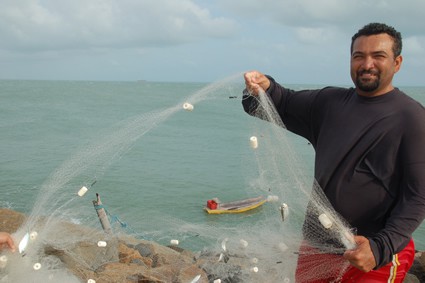
Adriano loves the poor fishing village of Serviluz where he was born. Serviluz is located in Fortaleza, Brazil.
The small community has fragile cement houses, their walls worn from years of salt corrosion. The narrow streets have pavement partly hidden below the sand of the beach, and there is a privileged view of the blue-green ocean.
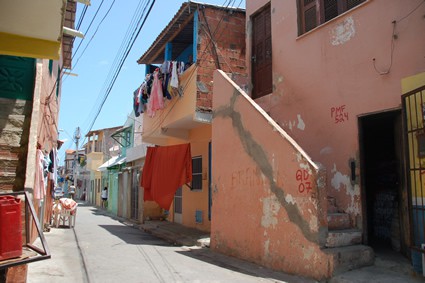
Walking through the community, three centuries seem to be mixed. There are signs of the 19th century, when the village began. A drought in the countryside caused the migration of thousands of people to oceanside cities in the 20th century. And the 21st century has brought industrial fishing and large boats that “steal” fish from the fishermen who still use little boats.
According to Adriano, before industrial fishing the shoals were close to shore, but they are moving farther and farther away. Adriano tells us,
“I saw on TV that the small-scale fishing will disappear within 40 years.”
His family’s survival depends on what he is able to catch.
Every day, Adriano wakes at 3:30 a.m. and returns home around 3:00 p.m. Success in fishing depends on the time of year.
“Starting in May, we are able to catch big fish the size of a man. January and February are difficult months; we catch only small fish, the size of sardines. In January and February, the tide does not allow me to see the shoal through the water.
“But, God made everything perfect and there is a time for everything.”
Adriano and many other fishermen sell their fish to men called crossers.
Crossers buy fish from the fishermen, haggling for the lowest price possible in order to sell the fish to markets in the city for the highest price possible.
The fishermen make a good profit. For each kilo of premium fish, Adriano earns around 10 Brazilian reais (BRL), which is about U.S.$6. When the fishing is good that means Adriano earns 200 to 300 BRL ($116 to $175) per week.
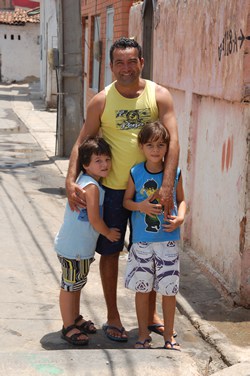
Adriano sells a kilo of sardines for 90 centavos (about 50 US cents). At the end of the day, he is able to catch up to 50 kilos. That means about U.S.$26 per day to support his family.
Adriano’s sons Sérgio and Francisco are enrolled at Projeto Vila Mar. Sérgio tells us,
“I’m not happy that my dad is fisherman.”
Adriano hears this and laughs. Sérgio is afraid the ocean will swallow his dad one day.
Francisco adds,
“I’m glad my dad is a fisherman … but, sometimes, I don’t like it just a little bit.”
Both boys love to eat the fish their dad catches.
When the fish are big, Adriano’s girlfriend, Cleidimar, likes to cut them into small pieces and fry them in flour so they are crunchy.
With sardines, she fries them after dipping them in flour and she serves them with “Baião de dois,” a mixture of beans and rice.
It is a very popular dish in the northeast region, especially in the state of Ceará.
In Brazil, it is traditional to eat fish during Easter, on Good Friday. Avoiding red meat and eating fish instead is an abstinence and respect regarding Christ’s sacrifice.
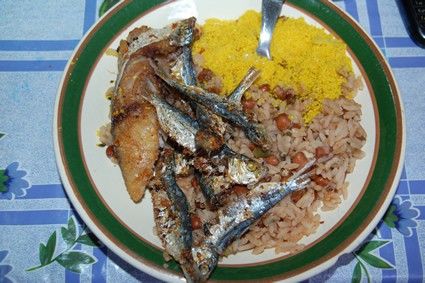
Influenced by Catholicism in Brazil, people have absorbed this tradition in Brazilian culture, regardless of their religion. The traditional dish for this period is Portuguese codfish stew. But because it is very expensive, poor people eat any kind fish, as does Adriano’s family.
Despite his love for his profession and the sea, Adriano dreams and works for a better future for his children.
“My sons know it is hard to support a family only by fishing. It is a life of much suffering. I want them to study and get good jobs.”
From the sea, they have learned to have patience. The words of Adriano could be used not only for the tide and the movements of the shoal, but also for himself: “God made everything perfect. There is a time for everything.”


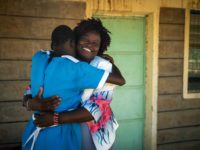
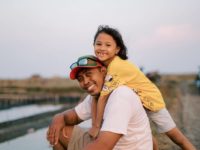



3 Comments |Add a comment
So wonderful to hear of Adriano’s faith in God.
“God made everything perfect. There is a time for everything.”
I love this simple profession of faith! Thank you, Ana.
I will be praying for lots of fish!
Thank you for sharing this Ana. It is a very insightful story.